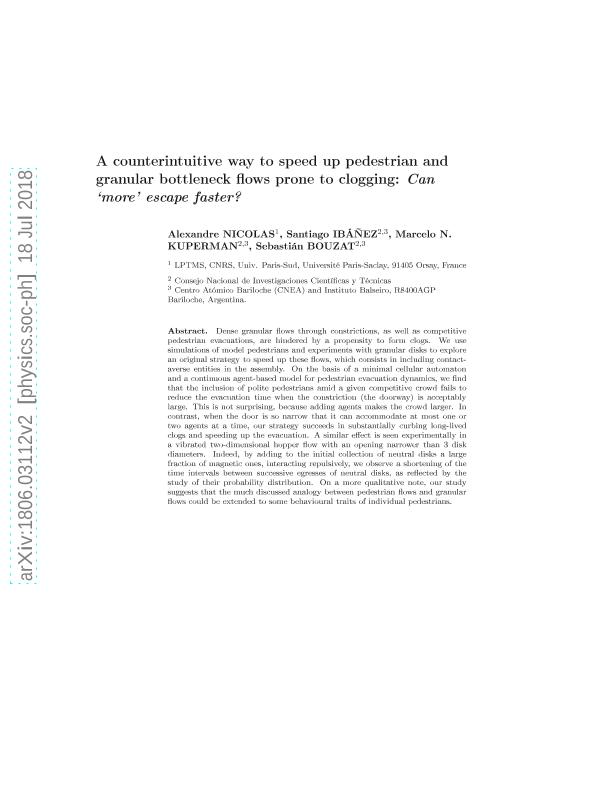Mostrar el registro sencillo del ítem
dc.contributor.author
Nicolas, Alexandre

dc.contributor.author
Ibáñez, Santiago Agustín

dc.contributor.author
Kuperman, Marcelo Nestor

dc.contributor.author
Bouzat, Sebastian

dc.date.available
2020-04-08T21:08:38Z
dc.date.issued
2018-08
dc.identifier.citation
Nicolas, Alexandre; Ibáñez, Santiago Agustín; Kuperman, Marcelo Nestor; Bouzat, Sebastian; A counterintuitive way to speed up pedestrian and granular bottleneck flows prone to clogging: can 'more' escape faster?; IOP Publishing; Journal of Statistical Mechanics: Theory and Experiment; 2018; 8; 8-2018; 1-16; 083403
dc.identifier.issn
1742-5468
dc.identifier.uri
http://hdl.handle.net/11336/102306
dc.description.abstract
Dense granular flows through constrictions, as well as competitivepedestrian evacuations, are hindered by a propensity to form clogs. We use simulations of model pedestrians and experiments with granular disks to explore an original strategy to speed up these flows, which consists in including contact-averse entities in the assembly. On the basis of a minimal cellular automaton and a continuous agent-based model for pedestrian evacuation dynamics, we find that the inclusion of polite pedestrians amid a given competitive crowd fails to reduce the evacuation time when the constriction (the doorway) is acceptably large. This is not surprising, because adding agents makes the crowd larger. In contrast, when the door is so narrow that it can accommodate at most one or two agents at a time, our strategy succeeds in substantially curbing long-lived clogs and speeding up the evacuation. A similar eect is seen experimentally in a vibrated two-dimensional hopper flow with an opening narrower than 3 disk diameters. Indeed, by adding to the initial collection of neutral disks a large fraction of magnetic ones, interacting repulsively, we observe a shortening of the time intervals between successive egresses of neutral disks, as reflected by the study of their probability distribution. On a more qualitative note, our study suggests that the much discussed analogy between pedestrian flows and granular flows could be extended to some behavioural traits of individualpedestrians.
dc.format
application/pdf
dc.language.iso
eng
dc.publisher
IOP Publishing

dc.rights
info:eu-repo/semantics/openAccess
dc.rights.uri
https://creativecommons.org/licenses/by-nc-sa/2.5/ar/
dc.subject
AGENT-BASED MODELS
dc.subject
TRAFFIC
dc.subject
CROWD DYNAMICS
dc.subject.classification
Otras Ciencias Físicas

dc.subject.classification
Ciencias Físicas

dc.subject.classification
CIENCIAS NATURALES Y EXACTAS

dc.title
A counterintuitive way to speed up pedestrian and granular bottleneck flows prone to clogging: can 'more' escape faster?
dc.type
info:eu-repo/semantics/article
dc.type
info:ar-repo/semantics/artículo
dc.type
info:eu-repo/semantics/publishedVersion
dc.date.updated
2019-10-15T17:55:26Z
dc.journal.volume
2018
dc.journal.number
8
dc.journal.pagination
1-16; 083403
dc.journal.pais
Reino Unido

dc.journal.ciudad
Londres
dc.description.fil
Fil: Nicolas, Alexandre. Université Paris Sud; Francia. Centre National de la Recherche Scientifique; Francia. Consejo Nacional de Investigaciones Científicas y Técnicas; Argentina
dc.description.fil
Fil: Ibáñez, Santiago Agustín. Comisión Nacional de Energía Atómica. Gerencia del Área de Energía Nuclear. Instituto Balseiro; Argentina. Universidad Nacional de Río Negro. Sede Andina; Argentina. Consejo Nacional de Investigaciones Científicas y Técnicas; Argentina
dc.description.fil
Fil: Kuperman, Marcelo Nestor. Comisión Nacional de Energía Atómica. Gerencia del Área de Energía Nuclear. Instituto Balseiro; Argentina. Universidad Nacional de Río Negro. Sede Andina; Argentina. Consejo Nacional de Investigaciones Científicas y Técnicas; Argentina
dc.description.fil
Fil: Bouzat, Sebastian. Comisión Nacional de Energía Atómica. Gerencia del Área de Energía Nuclear. Instituto Balseiro; Argentina. Universidad Nacional de Río Negro. Sede Andina; Argentina. Consejo Nacional de Investigaciones Científicas y Técnicas; Argentina
dc.journal.title
Journal of Statistical Mechanics: Theory and Experiment

dc.relation.alternativeid
info:eu-repo/semantics/altIdentifier/doi/http://dx.doi.org/10.1088/1742-5468/aad6c0
dc.relation.alternativeid
info:eu-repo/semantics/altIdentifier/url/https://iopscience.iop.org/article/10.1088/1742-5468/aad6c0
dc.relation.alternativeid
info:eu-repo/semantics/altIdentifier/url/https://arxiv.org/abs/1806.03112
Archivos asociados
